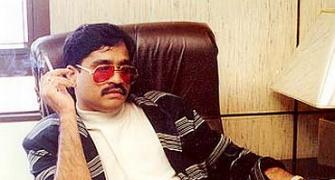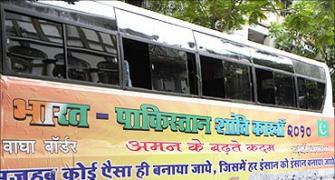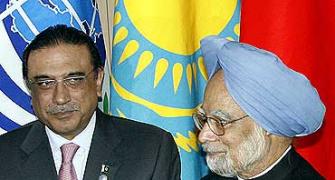As India brings up the issue of cross-border terrorism and the 26/11 probe with Pakistan, it will also push for tough action against smuggling of narcotics, trade of counterfeit currency when the home secratatries of the two nations meet in New Delhi, reports Vicky Nanjappa.
Terrorism has so far been on top of the agenda during any dialogue between India and Pakistan, especially post the 26/11 attacks and this stood true even at the meeting between Indian Home Secretary GK Pillai and his Pakistani counterpart, Chaudhary Qamar Zaman on Monday. As the two leaders discussed Pakistan's progress in the 26/11 probe, sources say, another talking point during the two-day talks will be the menace of fake currency circulation and the even bigger problem of narcotics smuggling.
There has been enough evidence to prove that drug trade in India, which has its roots in Pakistan and Afghanistan, has increased manifold. Statistics also show that drug trafficking from across the border has seen a sharp rise.
Intelligence Bureau officials say that the money that is generated through the drug trade is huge. Druglords earn anything between Rs 10,000 to Rs 20,000 crore every year and a large chunk of this used to fund terror. The Lashkar-e-Tayiba and the Taliban receive anything between Rs 1,500 to Rs 2,000 crore through the drug trade, say sources.
Pillai is expected to bring up this issue with his Pakistani counterpart so that a strategy between the two nations can be worked out to stop the trade.
Both India and Pakistan act as transit points for drug trade, which emerges from Afghanistan. However the point that India is trying to make is that Pakistan provides an easy route to peddlers to push their drugs into India. Indian authorities say that on an average at least 2,000 kg of opium is seized every year, which is being smuggled from across the border. And the quantity is expected to be much more since a large chunk often goes undetected.
India expects more cooperation from Pakistan in tackling the ever-increasing menace of narcotics smuggling, but Indian intelligence agencies claim that there's little hope of help from across the border. The Inter-Services Intelligence facilitates the drug trade since it is a major source of funding of terror activities. In Afghanistan, where drugs are produced, the ISI has helped create safe routes for smuggling. They are routed through Nepal or Pakistan to India, say insiders. In addition to this, the ISI has specifically instructed its rangers along the borders to permit peddlers smuggling drugs.
India expects Pakistan to act tough in Afghanistan in order to curb narcotics smuggling since 70 per cent of the drugs that are smuggled are from there, say sources. Indian intelligence agencies say that only Pakistan can take stock of this problem since all these peddlers are answerable to the ISI, which facilitates this trade.
Recently, the Narcotics Control Bureau arrested two peddlers who made it clear that they were pushed into this trade by the ISI. Probing them further revealed that the ISI had created a safe passage for them so that they could carry drugs into India.
India needs Pakistan to be more serious in tackling this problem since it is now spreading its roots across south India. Chennai is a hub for drug trade and this cartel is controlled from Goa. Now, according to sources in the Intelligence Bureau the menace is spreading to Kochi as well. Earlier, it was restricted mainly to Tirupur, Tuticorin and Varanasi. However, these operatives have set up base in most southern states, say sources.
Drug peddling contributes to 40 per cent of terror and since both these illegal activities go hand in hand. Another matter of grave concern is that these routes are also being used to smuggle arms. The main force behind the trade is fugitive underworld gangster Dawood Ibrahim. Operations of the D-Company, which controls 95 per cent of the drug trade, came to a standstill when ISI put a brake on its activities. The ISI made it clear to Dawood that if he wanted to continue the trade he need to finance terror options, an option that the don picked.
But intelligence sources point out that even India needs to do its bit. It is evident that the borders are weak which eventually allows these peddlers easy access to the country.







